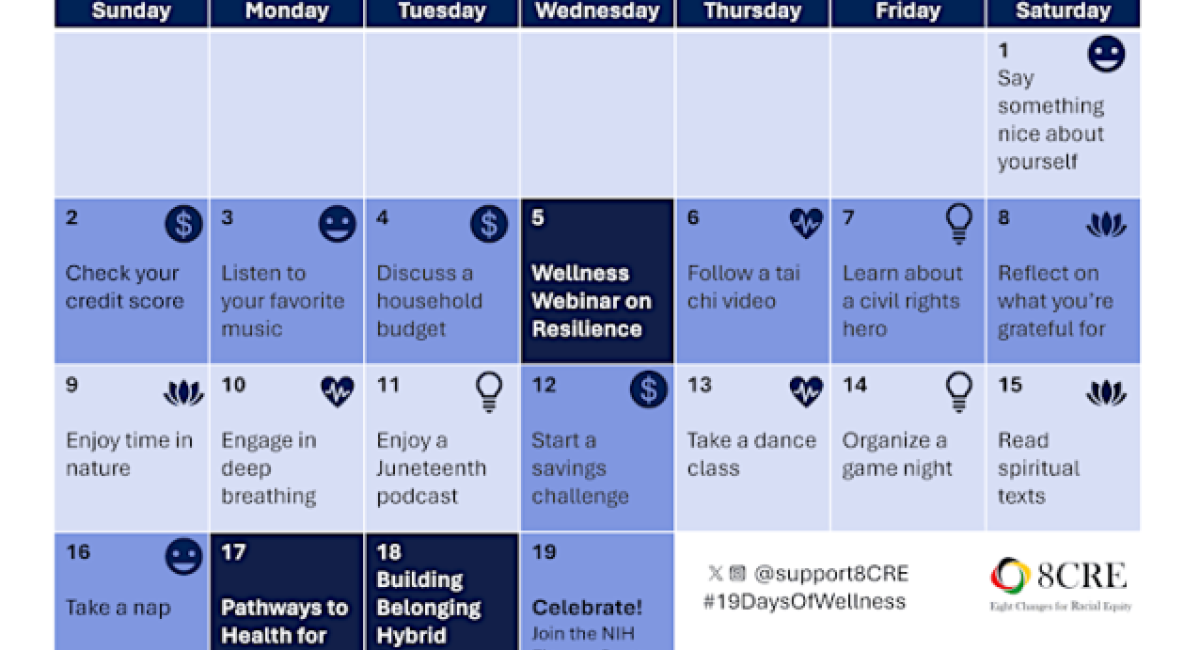Post written by guest blogger Emily Grugan; Postbac IRTA fellow, OITE Summer Program Staff Assistant

Emotional Intelligence
Emotional intelligence is our ability to identify and regulate our emotions, communicate in effective ways, have empathy for others, and work through conflict in constructive ways. You may notice that you have strengths in certain areas of emotional intelligence and room for improvement in others. We are not born with a fixed emotional intelligence; we are able to improve these skills throughout our lives. With enhanced emotional intelligence our relationships can be healthier, our success greater in school and at work, and we become more equipped to motivate ourselves to attain our personal and professional goals.

Fostering Our Mental Health
With close attention being paid to mental health, particularly in the workplace, we are all becoming more aware of its importance. This shift in awareness is certainly important, but too often the conversations we are having about this topic are happening through a deficit lens – one that is solely focused on the treatment or avoidance of illness. But fostering our mental health is about more than just relieving distress and disorder; it’s also about understanding and building on our strengths that contribute to psychological wellbeing and a longer, healthier life.
Managing our Time to Support Well-being and Success at Work
People often reach out for support around time management, hoping that with the right system, tracker, trick, or calendar gadget, they will be primed for ultimate productivity and success. Unfortunately, the answer is rarely that simple and it almost never lies in a fancy planner or app. Time management is connected to and impacted by several different factors - our values, our environment, our motivation and energy, and our physical and mental health, to name a few – which is why there is no one-size fits all intervention here. But some helpful concepts that can empower us all to navigate our unique time management hang-ups are:

Navigating Difficult Conversations about Mental Health and Well-being
Each person’s mental health exists on a continuum, often fluctuating due to a variety of factors, including but not limited to, the state of our physical health, the stressors we’re navigating, or typical life changes like loss or gain of a relationship, a move, or job change. It’s no surprise then that most of us will experience mental health concerns at some point in our lives. As a result, it’s necessary to begin building awareness and language that empowers us to effectively support a colleague or friend who may be struggling or seek support for ourselves when needed.

Performance Anxiety
Performance anxiety is defined as the fear of performing a specific task. Many of us have experienced some physical and/or psychological distress before a major event in our life. These events can include speaking in front of people, taking an exam, an interview for a new position, or a presentation at work. Performance anxiety is extremely common, affecting roughly 40% of all adults in the U.S. Many famous performers have been open about their struggles with performance anxiety, for example, the late actor Paul Newman, international singers Adele, Rihanna and Katy Perry, and Olympic gymnast Simone Biles have spoken publicly about their fears.
Considering Hard Choices as Opportunities to Shape Your Life
This is a time of year when some trainees may have more than one opportunity/offer to choose a medical school, graduate program acceptance, or job offer.
Sometimes, trainees are clear about their top choice right away and sometimes the decision is harder.
Ruth Chang from the University of Oxford has given a thoughtful TED talk about situations like these.
When options are close, and as Ruth Chang, says “on a par”, then you have the opportunity to reflect and decide how you want to shape your life, what values are important to you.
Learning to Wait Well
Waiting for news about our future, whether that be about grad or med school, a new job, or a health diagnosis, can be hard to tolerate. With it often comes feelings of anxiety, fear of the unknown, or worry about potential news we’re not hoping for. These feelings are often intense and highly uncomfortable so we can find ourselves coping with them by distracting, numbing, avoiding, or constantly checking our devices for any new information that may have come in the last few minutes. This can sometimes feel like a new-found anxiety.

Disentangling Our Identities from Work
Our self-identity is central to our well-being. “Who am I?” is not just a question that we contemplate during adolescence but one we come back to throughout our lives. As adults, our careers or jobs are a part of our identity. Having a job that we love is a goal for many; it can bring about a sense of belonging, a sense of purpose and satisfy intellectual curiosity. A strong work identity can be tied to an overall healthy well-being. There are situations, though, in which work becomes our sole identity. Our culture prioritizes this work identity, often rewarding burnout over balance.

Grounding Skills
Grounding skills are a set of physical, mental, and soothing strategies that help us manage stress and anxiety, including trauma-related distress. They consist of small tasks that are designed to distract us from our distress by heightening our awareness of our current environment and refocusing on the present moment. They help us create a safe space so that we can center ourselves and gain control over our strong emotions and prevent us from spiraling into negative thought patterns.




